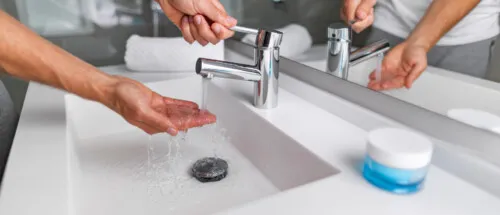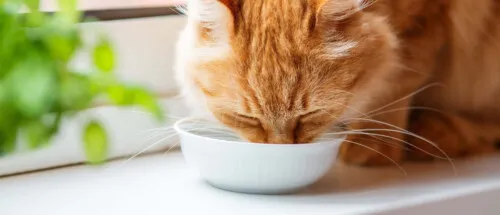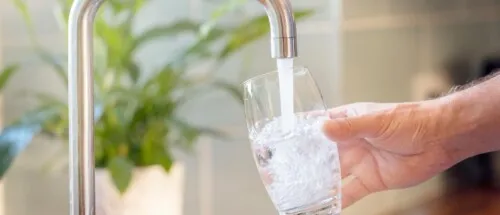Your go-to guide to get rid of hard stains from dishes, showers, faucets, and more.
Hard water stains (aka hard water spots) can be the bane of any homeowner’s existence. These unsightly marks not only make surfaces look dirty but can also cause long-term damage if not dealt with properly. Fortunately, there are many ways to clean hard water stains and prevent hard water buildup from recurring.
At Leaf Home Water Solutions, we understand the frustration of battling hard water stains because we’ve been there ourselves. From everyday household ingredients like white vinegar and baking soda to specialized commercial cleaners, our guide covers a variety of effective solutions. Whether you’re tackling glassware, showers, faucets, or toilets, you’ll find practical cleaning tips to make your home shine again.
What is Hard Water?
Hard water is simply water that contains a high concentration of dissolved minerals, primarily calcium and magnesium. As water travels through rock and soil, it picks up these minerals before reaching your taps. Unlike soft water, which lacks these minerals, hard water leaves white, chalky deposits on surfaces, glassware, and fixtures. You might notice spots or streaks on your dishes or stubborn residue on your shower walls—these are common signs of hard water stains.
The minerals in hard water can also cause limescale buildup inside appliances like water heaters and refrigerators, leading to inefficiencies and potentially costly repairs. While hard water isn’t harmful to your health, it can be a nuisance for home maintenance.
Best Hard-Water Stain Removers
When it comes to tackling hard water stains, the right tools and ingredients can make all the difference. Let’s break down some of the best options for removing those stubborn mineral deposits from around your home. These solutions are not only effective but also accessible and easy to use.
-
White Vinegar
White vinegar is a versatile cleaning solution. Its acidic nature helps dissolve mineral deposits, making it an excellent choice for targeting hard water stains. Whether on glassware, faucets, or tiles, simply spray white vinegar on the affected area, let it sit for a few minutes, and then wipe it away. The stains will soften and come off with minimal scrubbing, leaving your surfaces sparkling clean.
-
Baking Soda
Baking soda is another household staple that excels at cleaning hard water stains. This mild abrasive can scrub away stubborn hard water stains without scratching delicate surfaces. For the best results, combine baking soda with white vinegar. The resulting fizzy action helps lift and break down mineral buildup effectively. Just add water to make a baking soda paste, apply it to the stain, and scrub gently.
-
OxiClean Foam-Tastic
OxiClean Foam-Tastic is a commercial cleaner that tackles tough stains, including hard water buildup. Its foaming action allows it to penetrate and break down mineral deposits efficiently. Spray it on the stained area, let it foam up and work its magic, then rinse or wipe it away. It’s particularly effective for larger surfaces like showers and tubs, where hard water stains can be extensive.
-
Borax
Borax is a potent cleaner known for tackling tough stains, including hard water deposits. It’s especially useful on resilient surfaces like tiles and porcelain. To use borax, sprinkle it directly onto the stained area or mix it with water to form a paste. Apply it to the stain, let it sit, and then scrub away with a brush. The stains will disappear, leaving your surfaces clean and fresh.
-
Hydrogen Peroxide
Hydrogen peroxide is a gentle yet effective cleaner, perfect for delicate surfaces that need a softer touch. It works well for removing stains from glass and ceramics without causing damage. Apply hydrogen peroxide directly to the stained area, let it sit for a while, then scrub lightly and rinse. It’s a great option for those who prefer a non-toxic, chemical-free approach.
-
Lemon Juice
Lemon juice is not just for cooking—it’s also a natural cleaner packed with citric acid, which effectively breaks down mineral deposits. Use lemon juice to tackle minor hard water stains by applying it directly to the stained area. Let it sit for a few minutes, then scrub and rinse. Plus, it leaves a fresh, pleasant scent behind, adding a touch of natural fragrance to your cleaning routine.
-
Bleach
Bleach is a powerful disinfectant that can also be used to remove hard water stains, especially in areas prone to mold and mildew. It’s effective in whitening surfaces and breaking down mineral deposits. To use bleach, dilute one part bleach with ten parts water and apply the solution to the stained area using a spray bottle or cloth. Let it sit for 10-15 minutes, then scrub gently with a brush or sponge and rinse thoroughly with water.
For more information on how to address hard water issues at the source, check out our guide on the different types of water treatment solutions.
How to Remove Hard-Water Stains from Glassware and Dishes
Hard water stains on glassware and dishes can make your pristine dinner set look cloudy and uninviting. But don’t worry; you can quickly restore their shine with some household staples.
Supplies you’ll need:
- White vinegar
- Baking soda
- Soft sponge or cloth
Directions:
- Soak: Fill a basin with equal parts white vinegar and water. Place your glassware and dishes in the solution and let them soak for about 30 minutes.
- Scrub: After soaking, sprinkle some baking soda on a soft sponge or cloth. Gently scrub the stained areas.
- Rinse: Rinse thoroughly with water to remove any remaining vinegar and baking soda residue.
- Dry: Dry with a soft cloth to prevent new water spots from forming.
How to Remove Hard-Water Stains from Showers and Tubs
Showers and tubs are prime targets for hard water stains since they are frequently exposed to water and remain wet for an extended period. These stains can build up on tiles, grout, glass doors, and fixtures. Here’s how to reclaim the sparkle.
Supplies you’ll need:
- White vinegar
- Baking soda
- OxiClean Foam-Tastic
- Scrub brush
Directions:
- Spray: Apply white vinegar generously on the stained areas and let it sit for 15 minutes to break down the mineral deposits.
- Combine: Sprinkle baking soda over the vinegar-soaked area. The fizzing reaction helps lift the stains.
- Scrub: Use a scrub brush to work the mixture into the stains, using circular motions.
- Boost: For tougher stains, apply OxiClean Foam-Tastic according to the product’s instructions. Let it foam up and sit for the recommended time.
- Rinse: Rinse thoroughly with water to remove all cleaning products and admire your clean shower or tub.
How to Remove Hard-Water Stains from Faucets and Showerheads
Faucets and showerheads can become encrusted with hard water stains, affecting appearance and function. Here’s a straightforward way to tackle them.
Supplies you’ll need:
- White vinegar
- Plastic bag
- Rubber band
- Old toothbrush
Directions:
- Bag it: Fill a plastic bag with white vinegar and secure it around the faucet or showerhead with a rubber band. Make sure the stained area is fully submerged.
- Soak: Let it soak overnight to dissolve the mineral buildup.
- Scrub: Remove the bag and use an old toothbrush to scrub away any loosened deposits.
- Rinse: Rinse thoroughly with water to eliminate any remaining vinegar.
How to Remove Hard-Water Stains from Glass
Hard water stains on glass surfaces, such as windows, mirrors, and shower doors, can make them appear cloudy and less aesthetically pleasing. With the right techniques and supplies, you can restore clarity and shine to your glass surfaces.
Glass Shower Doors
Glass shower doors are especially susceptible to hard water stains, making your bathroom look less than fresh. Here’s how to clear them up.
Supplies you’ll need:
- White vinegar
- Baking soda
- Microfiber cloth
Directions:
- Spray: Apply white vinegar to the stained glass and let it sit for about 10 minutes.
- Scrub: Sprinkle baking soda on a damp microfiber cloth and scrub the glass in circular motions.
- Rinse: Rinse with water and wipe dry to avoid new spots.
Windows
Windows should let light in, not showcase hard water stains. Let’s get them sparkling again.
Supplies you’ll need:
- White vinegar
- Water
- Soft cloth
Directions:
- Mix: Combine equal parts white vinegar and water in a spray bottle.
- Spray: Apply the solution to the windows.
- Wipe: Use a soft cloth to clean the windows, removing all residues and leaving a streak-free finish.
How To Remove Hard-Water Stains From Toilets
Toilets often bear the brunt of hard water stains, leading to unsightly rings and discoloration. Here’s how to banish those stains for good with a DIY toilet bowl cleaner.
Supplies you’ll need:
- Borax
- White vinegar
- Toilet brush
Directions:
- Prep: Pour 1/4 cup of borax into the toilet bowl.
- Add: Add 1 cup of white vinegar and let the mixture sit for 15 minutes to break down the stains.
- Scrub: Use a toilet brush to scrub the bowl, paying extra attention to stained areas.
- Flush: Flush to rinse away any remaining solution, revealing a clean, stain-free toilet.
Stop Hard Water Stains Before They Happen
Dealing with hard water stains can feel like an uphill battle, but it doesn’t have to be. By addressing the root cause of hard water, you can prevent future stains and keep your home looking its best. Consider installing a Leaf Home water softener to reduce the mineral content in your water. This simple solution not only protects your fixtures and appliances, but also ensures your water is clean and safe. You deserve a home free from the hassle of hard water stains–schedule your free water test today.
FAQs
What causes hard water?
High levels of dissolved minerals like calcium and magnesium cause hard water. As water travels through rock and soil, it absorbs these minerals, eventually making its way into your home’s supply.
How Do You Remove Calcified Hard-Water Stains?
Calcified hard-water stains, or limescale, can be particularly stubborn. To effectively remove them, soak the affected area in white vinegar for 15-20 minutes, then scrub with a brush. Alternatively, apply baking soda paste. Commercial cleaners like CLR (Calcium Lime Rust Remover) or OxiClean Foam-Tastic are also highly effective—just follow the label instructions.
Does CLR Bath Cleaner remove hard-water stains?
Yes, CLR Bath Cleaner is specifically designed to tackle hard-water stains, along with calcium and lime deposits. It’s a powerful solution for sinks, tubs, and showerheads. Spray it on the affected area, let it sit for a few minutes, then scrub and rinse thoroughly.
How can you tell if you have hard water?
There are a few telltale signs that you have hard water. Look for white, chalky stains on faucets, showerheads, and glassware, as well as soap scum buildup on showers, tubs, and sinks. Hard water can also leave your skin feeling dry and your hair looking dull. Additionally, if your larger household appliances aren’t performing as well as they used to, hard water could be the cause.
How can you prevent hard-water stains?
Preventing hard water stains starts with addressing the underlying issue. Installing a water softener can reduce the mineral content in your water, preventing future stains. Regularly clean and dry surfaces that come into contact with water to avoid buildup. Additionally, use a diluted vinegar solution to wipe down surfaces weekly to break down any forming calcium deposits before they become stains.



